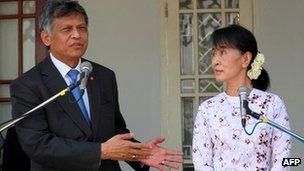Burma invites Asean observers for April elections
- Published

Asean Secretary General Surin Pitsuwan met Aung Sang Suu Kyi in Burma in February
Burma has invited foreign election observers for the first time to witness polls, officials from the Association of Southeast Asian Nations (Asean) say.
Asean said that it had been asked to send a total of 23 delegates including two MPs from each member state and media representatives.
Analysts say it is a small but symbolic step as the military-backed civilian government introduces cautious reforms.
Forty-eight seats in parliament are being contested in the 1 April vote.
Pro-democracy leader Aung San Suu Kyi is standing for the first time since 1990, when Burma's military leaders refused to recognise her National League for Democracy (NLD) party's election victory.
The BBC's Jonah Fisher in neighbouring Thailand says that the Burmese authorities badly need this election to be seen as credible.
Our correspondent says that they have bowed to international pressure by inviting Asean to send observers for polling in the 48 seats.
They will at best get only a limited picture of polling, says our correspondent, but this still represents a step change from the last vote in 2010, which was widely condemned as being neither free nor fair with no foreign observers and with Ms Suu Kyi under house arrest.
The US, European Union and the UN have described the polls as "a key test" of the government's commitment to reforms.
It is not expected that the vote will change the balance of power in Burma, even though it is being seen as hugely symbolic.
A nominally civilian government took office in Burma last March after nearly 50 years of military rule.
The new government has surprised many people by releasing hundreds of political prisoners, introducing media freedoms and allowing Ms Suu Kyi to run for a seat in parliament.